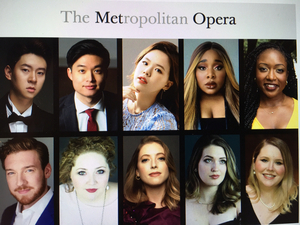Review: New Name, Same Competition as Met Council Awards Morph into Laffont Competition and Announce 2021 Winners
Tenor Kim, sopranos Kim and McMillon, and mezzos Sierra and Treigle come out on top

(bottom) 1,2 from right: Treigle, Sierra
In these (hopefully waning) days of the pandemic, organizations like the Met are still looking for new ways to fund their activities. That became apparent on Sunday afternoon when the winners of what had been the Met's annual National Council Auditions now is called the Eric and Dominique Laffont Competition. The Laffont name is also attached to the finals concert and each of the winners doesn't just get $20,000 but an award with a name attached.
This year's winners were Korean soprano Hyoyoung Kim (the Birgit Nilsson Award), soprano Raven McMillon (the Faith P. Geier Award), tenor Duke Kim (the Dominique Laffont Award), mezzo Emily Treigle (the Alton E. Peters Award) and mezzo Emily Sierra (the Noreen Zimmerman Award). They were accompanied by pianists Kyoung han Bae (H. Kim), Gracie Francis (Sierra), Kirill Kuzmin (McMillon), Bethany Self (Treigle) and William Woodard (D. Kim).
I'm sure that the concert--charmingly emceed by bass-baritone Ryan Speedo Green, a former winner, with some help from the equally charming Lisette Oropesa--was even harder than usual on the participants, given the circumstances and the lack of a live audience. (I'm sure, though, that there may have been some who found it easier not being on stage to a packed house at the Met and could concentrate on their singing rather than keeping any stage fright in tow.)
And it must have been more difficult than usual for the judges to parse the individual performances. Obviously, they have certain criteria that are different from the ones viewers have-notably the pure pleasure that the singers gave us-so the winners on paper weren't necessarily the ones any particular viewer might have chosen.
I also find it puzzling that, with all the repertoire at their disposal, that some arias show up more than once. For example, two singers chose the gorgeous mezzo aria "Deh per questo istante solo" from Mozart's LA CLEMENZA DI TITO. In this case, both were award winners (and share a first name and age, 23): Emily Treigle and Emily Sierra. Their renditions were quite different but both were compelling.
In Sierra's performance, I particularly noticed similarities to Cherubino's aria, "Voi che sapete" from LE NOZZE DI FIGARO, though Treigle's singing was equally effective on a larger scale. (Treigle also sang "Addio, addio, o miei sospiri" from Gluck's ORFEO ED EURIDICE, while Sierra chose "Ich lade gern mir Gäste ein"-AKA, the charmer "Chacun a son gout"--from DIE FLEDERMAUS.)
These included the most contemporary piece on the program, Andre Previn's "I Want Magic" for the soprano role of Blanche DuBois from his operatic treatment of Tennessee Williams' A STREETCAR NAMED DESIRE. Both the sopranos taking it on had very different voices from Renee Fleming, who originated the role: both Brittany Olivia Logan and Murrella Parton (both runners up) had big sounds, as well as being dramatically appealing and expressive. (Logan also sang Puccini's "Senza mamma" from SUOR ANGELICA, while Parton chose "Tacea la notte placida" from TROVATORE.)
Winning soprano Raven McMillon was clear as a bell in the fairy godmother's aria from Massenet's CENDRILLON, "Ah! Douce enfant" as well as in the gorgeous Presentation of the Rose, "Ich bin Euer Liebden sehr verbunden," from DER ROSENKAVALIER (Strauss). Tenor Duke Kim (from South Korea, though representing the Western US region) didn't miss any of those killer C's in Donizetti's "Ah! Mes amis," from LA FILLE DU REGIMENT, after warming up with Mozart's "Dies Bildnis ist bezaubernd schon" from DIE ZAUBERFLOTE.
The other winning competitor from South Korea, soprano Hyoyoung Kim, did well by a couple of war horses: "The Bell Song" from Delibes's LAKME, where all her 'bells' were pure and RIGOLETTO's "Caro nome" from Verdi, which was of the songbird variety, though she ended on a demure, thoughtful note.
Congratulations to all the award winners-but anyone who made it this far in the competition certainly must be entitled to that description. Besides the two sopranos already mentioned, there was a third, Erica Petrocelli, who did Mozart's dramatic "Come scoglio" from COSI FAN TUTTE and Gounod's "Poison aria" from ROMEO ET JULIETTE.
Then, there was a bass-baritone, South Korean Jongwon Han, who I admired, even though I was disappointed that there were transmission problems with his otherwise fine first aria, "Ves tabor spit," from Rachmaninoff's ALEKO (his other was Leporello's dizzying "Catalog aria" from DON GIOVANNI) and baritone Timothy Murray, who brought hot blood to his aria from Leoncavallo's PAGLIACCI ("E fra quest'ansie in eterno vivrai") and poise and spirit to Mozart's "Hai già vinta la causa ... Vedro mentr'io sospiro" from FIGARO.
That was the Laffont Competition in a nutshell (well, maybe a big nut). I'm glad that the show got to go on, despite COVID. Let's hope next year is a easier one for everyone involved.
Comments
.png)
|
.png)
|
Videos


